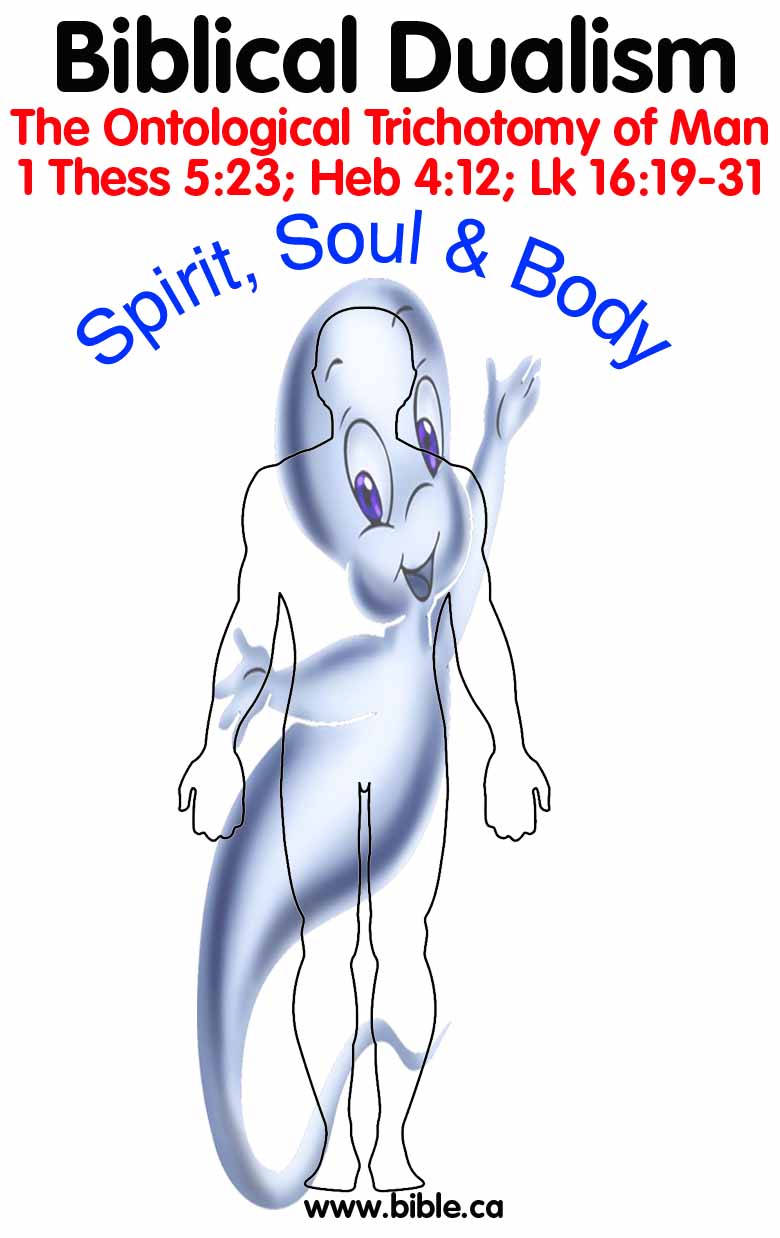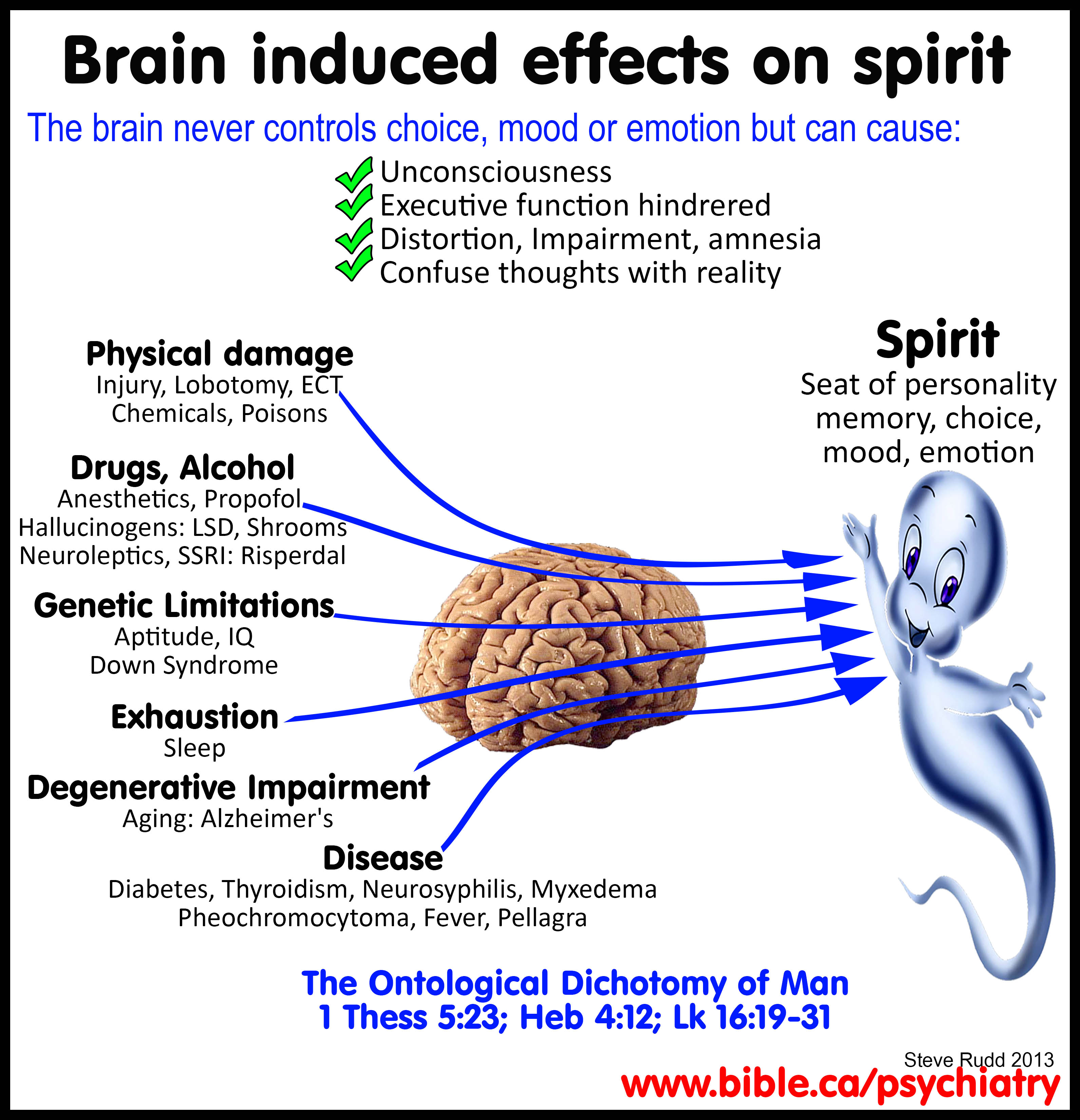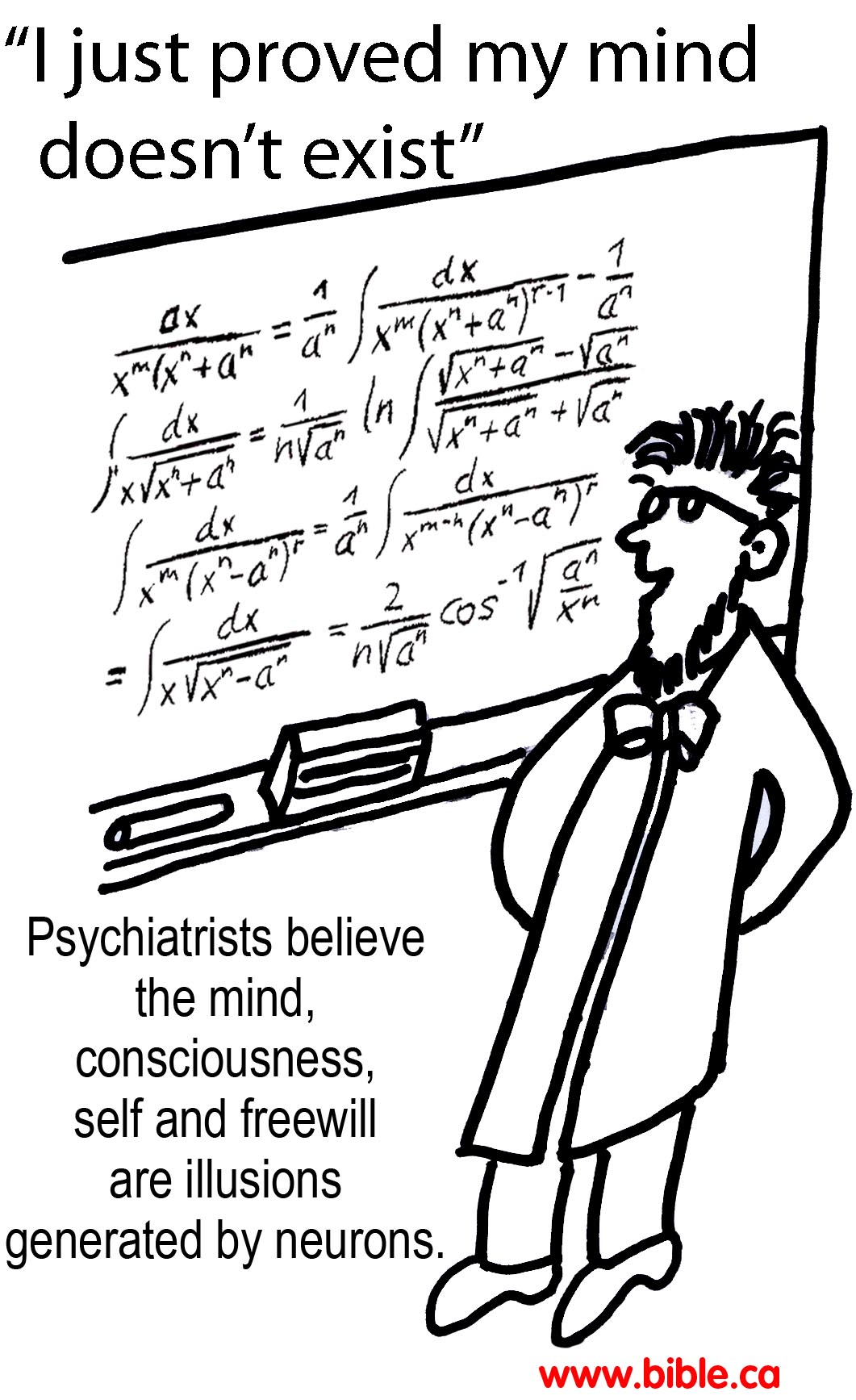The Ontological Trichotomy of man
|
|
Man is made of two kinds of "stuff": Physical: Body |
Introduction:
- Insanity is thought, mood and behaviour. Thought behavior really exists as real energy, but it has no physical component. Thoughts cannot be measured or seen, but are part of the spirit world where God exists. Thought are real, but they are not physical." Thoughts are energy, but they are not part of the periodic table. There are no body chemicals that represent thought or mood. Behaviours are thoughts, moods that can control and manifest themselves in our physical body. Understanding this is simple Christian doctrine from the Bible is the fundamental flaw in chemical psychiatry.
- Christians know that man has a dichotomous ontology and that we consciously survive death in the spirit world. Ontology is the mechanical makeup of man with separate spirit and body. Dichotomy simply means two separate kinds of parts. A chestnut is a monochotomous seed with a single part, but a peanut is a dichotomous seed that can be broken into two halves. Man is dichotomous because he is half spirit and half physical.
- The entire man is actually trichotomous (three parts) in nature because the Bible speaks of a distinction between soul and spirit and body. However, we prefer to use the term dichotomous because it denotes a material differential between the physical body and the nonphysical (spirit and soul). "For the word of God is living and active and sharper than any two-edged sword, and piercing as far as the division of soul and spirit, of both joints and marrow, and able to judge the thoughts and intentions of the heart." (Hebrews 4:12) "Now may the God of peace Himself sanctify you entirely; and may your spirit and soul and body be preserved complete, without blame at the coming of our Lord Jesus Christ." (1 Thessalonians 5:23)
- The mind, the person, the soul all refer to that which has its seat in the spirit. The Christian knows from Luke 16:19-31, that the spirit of man consciously survives death. Death is the separation between the body and the spirit/soul. When a man dies, his body returns to dust, but his personality passes into the spirit world to await judgement with all his earth memories intact.
- The root battle ground between chemical psychiatrists and Christians is the nature of man. Chemical psychiatrists believe man has a monochotomous ontology, being nothing but a pile of chemicals devoid of spirit and even deny freewill itself as an illusion of the brain.
- Psychiatry has a long history of being caustically hostile to Christianity and openly mocks this duel nature of man in the current edition of the DSM manual describing Christian doctrine of the soul as "foolish and obsolete, unfortunate, a plague, misleading, silly, ghost in the machine".
- Psychiatry's 300 year old war on Christianity comes as a surprise only to Christians. When you go to a real medical doctor, it is a matter of scientific blood texts and his personal religion is not part of the process. When you go to a biologic psychiatrist, he imposes his religion of humanistic evolution upon you and objective pathological science is not part of the process.
- Biological psychiatrists wrongly believe that brain chemicals and electrical impulses of neurons directly cause involuntary moral choices and insanity. This fatal error has derailed progress in psychiatric research for 300 years. Brain chemicals and drugs never force moral choices or any actions independent of freewill. Insanity happens in the spirit, not the brain. The brain is merely an interface device that connects the body to the spirit. It is like a USB cable that connects the CPU of your computer to the printer. Psychiatric research has dead-ended in looking to the brain for the cause of insanity for 300 years. Applying neuroleptic drugs and shocks to the brain to "treat" insanity, is like hitting the USB cable with a hammer to fix a software problem in the "spirit" (CPU).
- Chemical psychiatrists of today have the same basic
mechanical view of the human brain as did doctors 200 years ago. The only
difference is that today, they use "scientistic sounding"
language of neurons and Serotonin. The quacky ideas of the evolutionist
psychiatrists sounds as scientific today, as did "The brain secretes
thought as the liver secretes bile", did 200 years ago. Both are
equally wrong.
"The brain secretes thought as the liver secretes bile." (On the relations between the physical and moral aspects of man, Pierre Jean Georges Cabanis, 1802 AD)
"The brain secretes thought as the stomach secretes gastric juice, the liver bile, and the kidneys urine." (Letters on physiology, Karl Vogt, 1845-46)
"The brain secretes thought as the kidney secretes urine." Jakob Moleschott, 1822-1893) - Man is part physical and part spiritual (non-physical). The physical part of man (the body) is made of the 118 elements of the periodic table. The non-physical part of man (the spirit) is not made from this creation, but is made of the same "stuff" that God is made of. God created man in his spiritual image. The elements of our body did not exist before 10,000 years ago, so therefore our bodies are not made of the same stuff as the spirit world, which existed before this.
A. The dichotomy of man who is part physical and part spiritual: Luke 16:19-31
- In Luke 16:19-31 two men die and find themselves in the spirit world. They recognize each other, as well as Abraham. They retained their personalities, memories, mood, conscience, choice and emotions, even though their brains are destroyed.
- This forever and unequivocally proves that the brain is not the storage place of memory, mood, choice. The brain is an interface device between the body and the spirit the same way a USB cable connects a CPU to a printer.
- "Now there was a rich man, and he habitually dressed in purple and fine linen, joyously living in splendor every day. "And a poor man named Lazarus was laid at his gate, covered with sores, and longing to be fed with the crumbs which were falling from the rich man's table; besides, even the dogs were coming and licking his sores. "Now the poor man died and was carried away by the angels to Abraham's bosom; and the rich man also died and was buried. "In Hades he lifted up his eyes, being in torment, and saw Abraham far away and Lazarus in his bosom. "And he cried out and said, 'Father Abraham, have mercy on me, and send Lazarus so that he may dip the tip of his finger in water and cool off my tongue, for I am in agony in this flame.' "But Abraham said, 'Child, remember that during your life you received your good things, and likewise Lazarus bad things; but now he is being comforted here, and you are in agony. 'And besides all this, between us and you there is a great chasm fixed, so that those who wish to come over from here to you will not be able, and that none may cross over from there to us.' "And he said, 'Then I beg you, father, that you send him to my father's house— for I have five brothers—in order that he may warn them, so that they will not also come to this place of torment.' "But Abraham said, 'They have Moses and the Prophets; let them hear them.' "But he said, 'No, father Abraham, but if someone goes to them from the dead, they will repent!' "But he said to him, 'If they do not listen to Moses and the Prophets, they will not be persuaded even if someone rises from the dead.' " (Luke 16:19-31)
|
B. The spirit is the seat of mood, emotion, conscience, choice and personality: |
- The soul engine, as we call it, is an ontological structure that ties memory, conscience and freewill choice together. It is also the control center for mood and emotion. It accepts information from the outside, either from the body, or the spirit world after death. Behaviours and moral choices are determined by freewill choices in conjunction with the conscience. The conscience generates good feelings when we do that which we have been taught is right and bad feelings when we do that which we have been taught is wrong. There is a close interrelationship between memory, conscience and freewill. The spirit has perfect memory retention but is temporarily limited by the interface with the physical human brain. For example, while in the body we are not able to remember most of our past life. But after we die, we will have perfect recollection of all our life. The idea of "I saw my whole life pass before me" is what happens as soon as we die. We have instant unhindered memory of our past life. This makes judgement by God easy, since we will have perfect memory of the entire Bible (if we read it) and how our moral choices compared with the Bible pattern. The Bible indicates that there is a distinction between soul and spirit. Perhaps our diagram below maps the difference between soul and spirit.
- Personality
"Snowflake" is determined by God not DNA genetics and
roughly corresponds to an instinct. The spirit is something that God
creates and combines with a body at conception. Every personality is as
unique as a snowflake or fingerprint. There are no two personalities
alike! The modern psychology idea of a finite number of personality types
is wrong. For example, you could classify all snowflakes into broad categories
by superficial observation, but the fact remains no two snowflakes are the
same. Variables determined by God when he creates the spirit are:
Personality, intelligence (IQ), temperament, aptitudes. Personality is the
basic instinctive likes and dislikes. Other variables set by the
"personality" are aptitudes like if a person is musically
inclined or tone deaf, mechanically inclined or a number person like an
accountant. There are also male and female "snowflakes", since
there are unique patterns of thought for each sex. However, it is
important to remember that the predisposed "personality" is
greatly shaped and changed by his experiences throughout life. So while
identical twins may be born, where one gravitates to reading, music and drawing
pictures, and the other to building, sports and socializing, the far
greater factor in shaping their "personality" is their life
experience. Of course, all moral values are taught and likes and dislikes
are shaped by experience. For example, while a person may prefer an
Hawaiian pizza, contracting food poisoning from such a pizza at age 20 can
change this like into a dramatic dislike so that he picks the pineapple
off any pizza before eating it. Apart from sexual orientation, perhaps the
best example of "instinct" placed into the "heart of
man" is the desire to seek God Himself: "God has also set
eternity in their heart, yet in such a way, so that man will not find out
the work which God has done from the beginning even to the end [without special
revelation like the text of the Bible or being told directly by God].
" (Ecclesiastes 3:11) Clearly however, parenting and experience can
override, stifle, distort, mislead and derail this natural desire to seek
God.
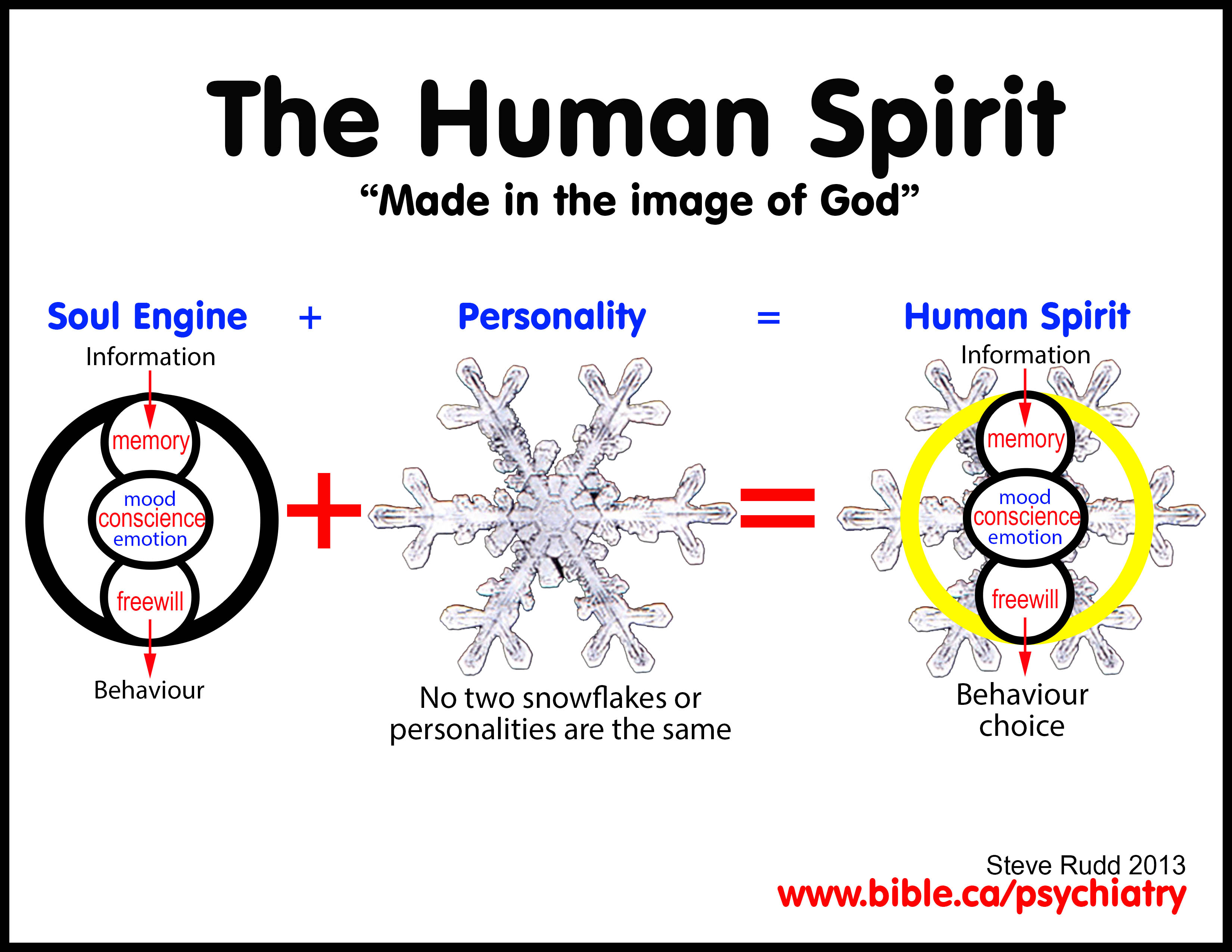
- The Human Spirit:
When you take a "snowflake personality" and combine it with a
"soul engine", you have a complete spirit. The soul engine is
combined with the personality snowflake, then tuned to either male or
female. Wilson Bentley was the first person to photograph snowflakes in
1885 AD. Here are 12 of Bentley's snowflakes which we equate
metaphorically with the uniqueness of each human spirit and personality.
When a human is born into the world, he already possesses a unique
personality pattern or disposition of likes and dislikes (snowflake).
However the newborn's reservoir of memory is empty, being a blank slate.
There is no prior knowledge or even intuition of real events of the past.
As the child lives, he acquires memories from his own contact with the
world. It is possible for his God given "predispositions" to be
changed by personal choices as a result of exeriences.
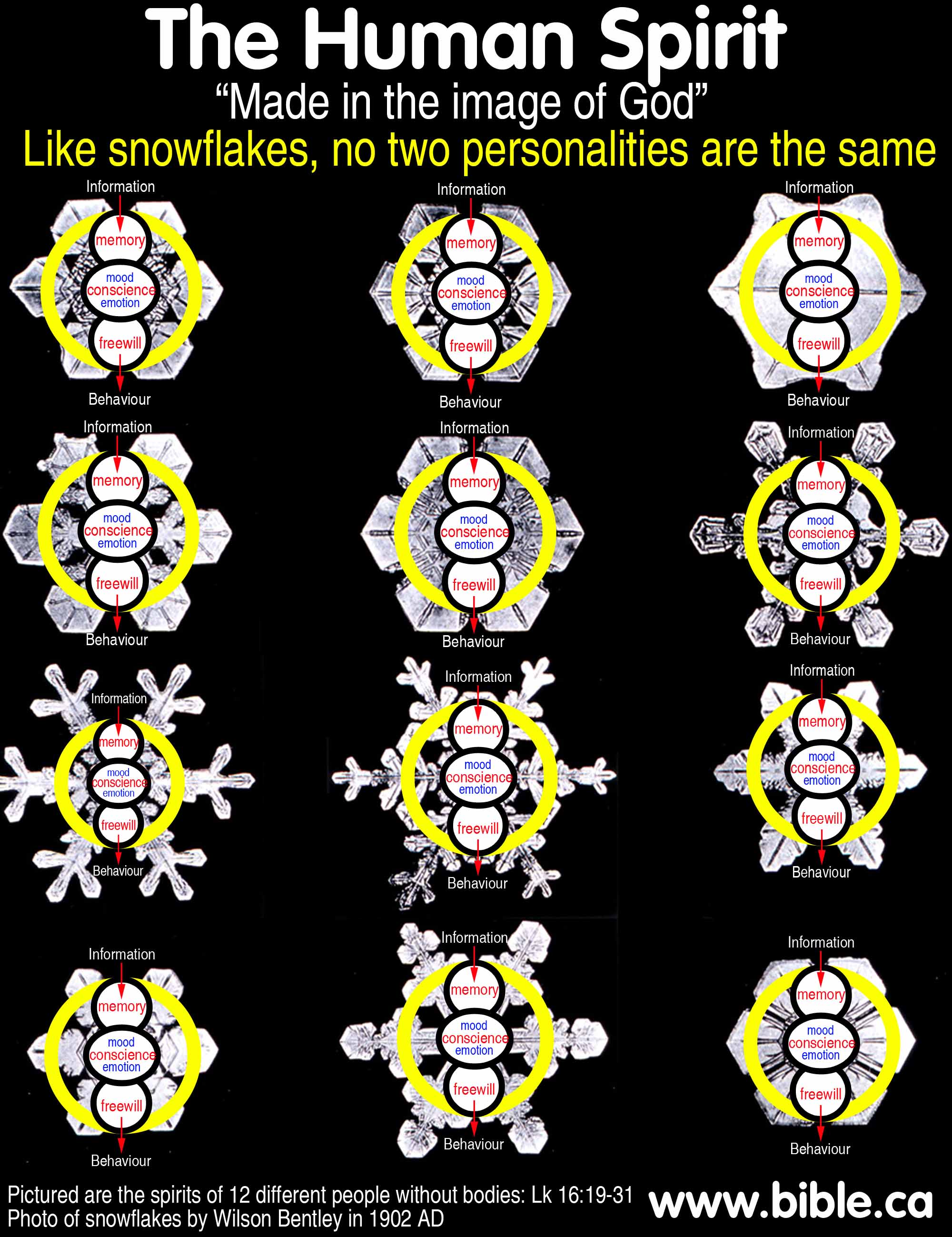
- The human Being: When you combine a human spirit with a body, you get a human being. The body is the determining factor if we have a photographic memory or are forgetful. One person can remember faces, names and events much easier than another. This is the personality variable in memory ability. The human spirit itself has perfect memory recollection. When we die, "our lives will not flash before our eyes", we will suddenly remember perfectly, everything we did in body. This makes the great judgement much easier for God who merely points out his law of good and evil behaviours and we can them immediately apply this law to our memories while in body. Hormones and body chemicals do not determine choice, but can affect choice. However, just as a brain injury can dramatically change a person's ability to remember, even wipe out an entire university education, so to each person's brain restricts each conscious spirit's ability to remember. This easily explains the incarnation of God into a man's body. When Jesus became man, His physical brain restricted his ability to remember and calculate. For example, God in heaven would have no problem calculating the cube root of 439208579875 to the 10,000th digit, in an instant. Such would have been impossible for Jesus or any man because of the limitation of human brain places on the spirit.
C. The body sends information to the spirit for decisions:
- The body is a mechanical robot and slave to the spirit but the body send information feed back to the spirit for processing. Body actions like arm movement, walking, reading and writing are all determined in the spirit.
- The body, brain chemicals and drugs never force moral choices or any actions independent of freewill.
- The body feeds information to the spirit for processing and then choices are made for action. This information includes all the 5 senses like touch, taste, smell, sound and sight. When the spirit receives this information, it makes a decision for mood, thought, action, moral choices and all the behaviours associated with insanity.
- Information is sent to the spirit that indicate body energy levels of fatigue. When we are fatigued, we need sleep and rest. The spirit chooses if the body will sleep. Just because the body calls for rest or sleep, the spirit can deny the body and choose not to rest. There are limits to how long the mind can defer sleep to the body. A point will come when the body actually overrides the spirit, even against its will, to sleep and become unconscious. Insomnia can be caused by body pain that prevents sleep. Insomnia can also be caused by the mind alone worrying and being anxious.
- Energy can be added at any time, even to a fatigued body, in the form of adrenaline. This information is also sent to the spirit for processing. The "adrenaline rush" is a burst of energy that can be added to either a well rested body or one that is very over tired and in need of sleep.
- The spirit is tempted to sin through three avenues: Lust of the eye, Lust of the flesh and pride of life. "For all that is in the world, the lust of the flesh and the lust of the eyes and the boastful pride of life, is not from the Father, but is from the world. The world is passing away, and also its lusts; but the one who does the will of God lives forever." (1 John 2:16-17) These three sins were present in the garden of Eden when Adam and Eve ate the forbidden fruit. "When the woman saw that the tree was good for food (Lust of the flesh), and that it was a delight to the eyes (Lust of eye), and that the tree was desirable to make one wise (Pride of life), she took from its fruit and ate; and she gave also to her husband with her, and he ate." (Genesis 3:6)
- There are two distinct "lusts of flesh": Desires for food or sex are sent to the spirit to make choices of action. When people diet, they can deny the body it's desire for food. When a body desires sex, the spirit can choose to satisfy this desire or deny it. Evolutionist activist judges believe the pedophile must obey the chemicals of his body as an "irresistible urge". This is why he sentences the pedophile to 3 months rehabilitation rather than the death sentence he deserves.
- The information that the body sends the spirit does not
have a direct effect on choice, mood or emotion. However it certainly can
have an indirect effect, on choice, mood or emotion. It is the spirit that
always makes the final choices of how to react to the information the body
sends to it. Chronic pain may or may not affect mood or emotion. A
Christian, for example, often has a joyful mood while enduring chronic
pain in the last week of his life, knowing he will soon see Jesus and be
in heaven! The non-Christian, on the other hand, often allows the pain to
send them into a depression because they have nothing to look forward to
after they die... "except damnation... if those Christians were right".
So either way the non-Christian has nothing positive to look forward to
after he dies and this indirectly affects his mood.
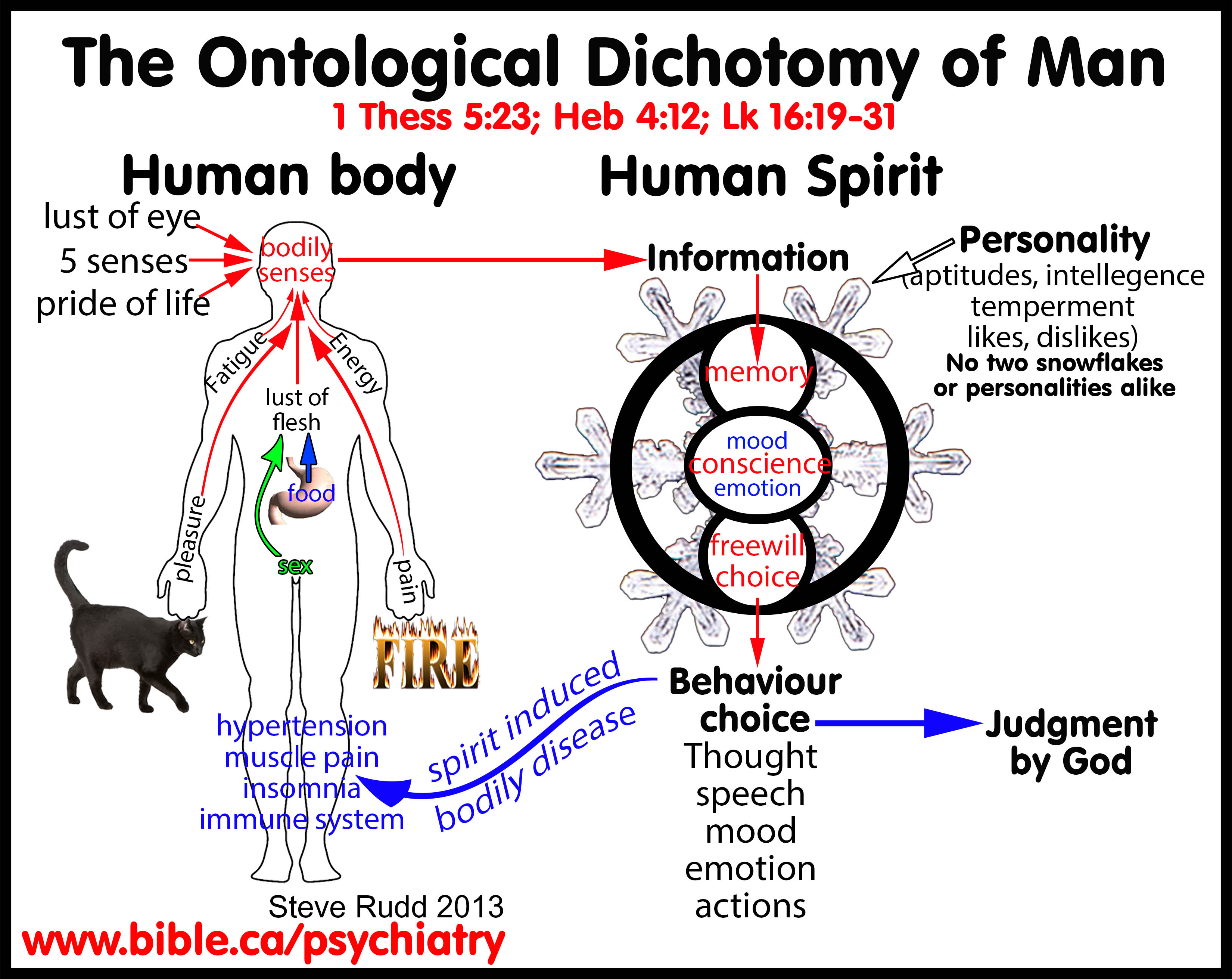
D. Spirit induced diseases to the body:
- The mind (spirit) can actually induce diseases to the body. This is opposite to the view of biologic psychiatrists who wrongly say the body directly causes insanity and moral choices independent of freewill.
- Spirit choices that cause disease and death to the body include: drugs, alcohol, cigarettes, eating large amounts of fatty sugary foods of low quality, anorexia, insomnia, ingesting poison.
- The mind alone can make the body sick. Prolonged anxiety is known to directly cause hypertension, muscle pain, insomnia, heart attack and generally wear down the immune system.
- Guilt for sin is a known cause of physical illness and can trigger behaviours associated with madness. Many Bible passages describe this process.
- When a person experiences a financial disaster, for
example, the mind makes a choice how to act. Some choose to become
anxious, but the Christian realizes that anxiety is sin and discharges all
cares to God by sunset and accepts his new lower standard of living. A
person who allows anxiety to continue will actually get psychically sick.
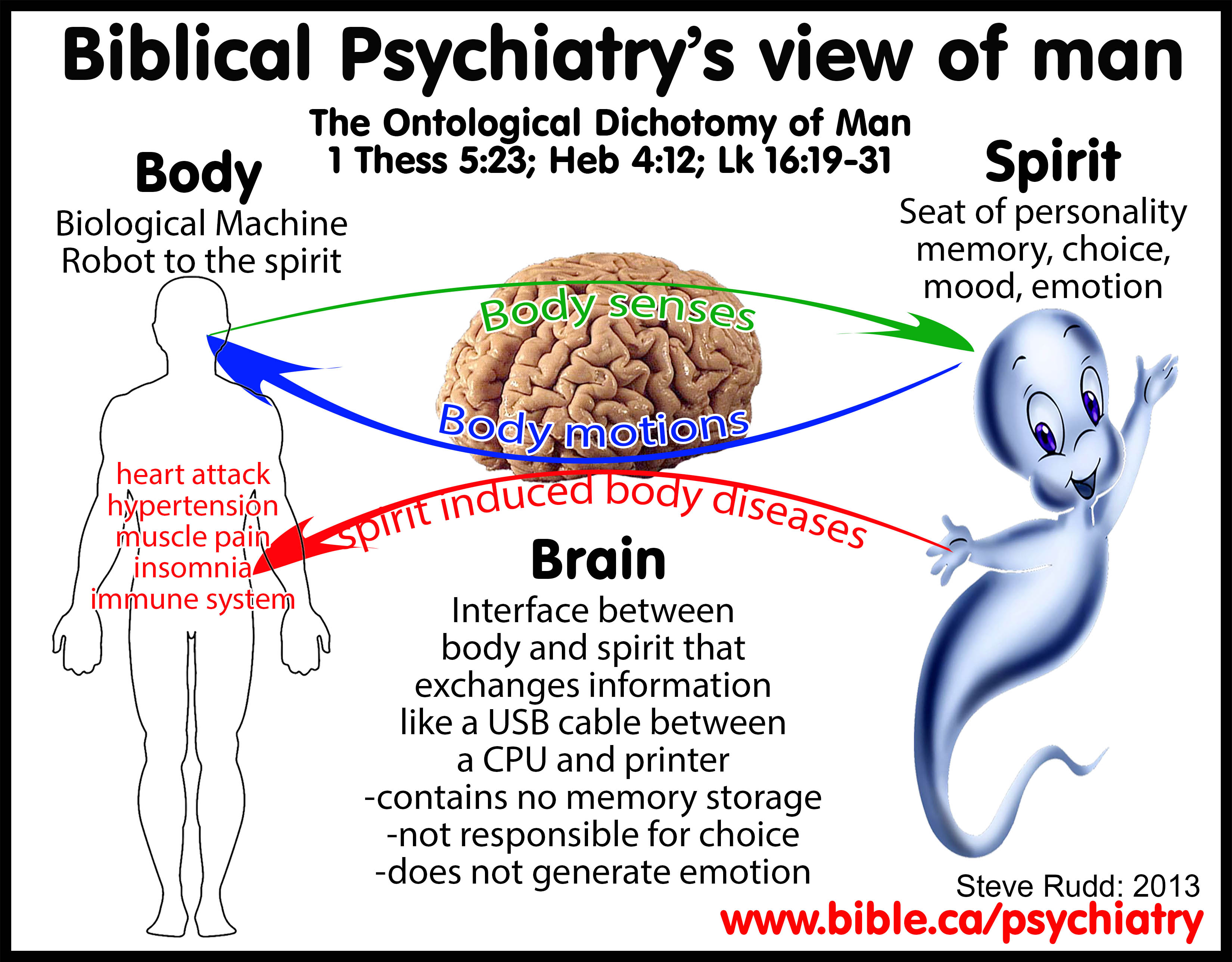
E. Brain induced effects on the spirit:
- The spirit and the brain and the body are all working together in the total man. The brain can have a direct effect on the spirit independent of will. However, this effect never forces moral choices, mood, emotion etc.
- The effects of the brain upon the spirit include: unconsciousness, hindering of executive function, distortion, impairment, confusing thoughts with reality.
- Physical damage to the brain:
Getting his on the head with a hammer can induce direct effects upon the
spirit like unconsciousness, "dumbing down" into a vegetative
stupor, amnesia etc. The classic lobotomy
cuts connections in between the frontal lobes and can have a serious
negative effect upon executive functioning. Rosemary Kennedy (John F's
sister) was turned into a vegetable after a lobotomy. Electroconvulsive
shock therapy (ECT) sends 450 volts DC at 1 amp across the brain and
does lots of physical damage which always causes amnesia. After ECT it
takes 5 to 10 minutes just to remember who you are. where you are. and
what day it is. The memories are all still intact in the spirit, they are
just not accessible while in the body.

- Drugs and alcohol:
Drugs can induce effects upon the spirit independent of will, but never
force moral choices against freewill. Anesthetics like Propofol can send
the spirit into unconsciousness. LSD and Shrooms can trigger
hallucinations where the spirit confuses thoughts with real events as
though they are really happening. The information flow from the body to
the spirit is distorted so that the spirit cannot tell the difference
between its own thoughts and information sent to it by the body.
Neuroleptics and SSRI's like Risperdal are chemical lobotomies that make
people indifferent like similar to alcohol. Alcohol, nicotine, opium,
cocaine, cannabis, barbiturates, sex hormones, steroids can all affect
behaviour but never force moral choices. Just as alcohol is not an excuse
for criminal or sinful behaviour, so too drugs do not force moral choices
and excuse on judgement day. Drugs do not cure insanity for the same
reason they do not cure chronic lying.

- Genetic limitations: Every person is born with a natural, genetically based limitation on the spirit's abilities. We all remember fellow students who pulled off 98% on exams without studying, while others failed. Some people are born with the genetic mutation of Down Syndrome and never develop past a six year old. These limitations to the spirit vary from person to person depending on their DNA.
- Physical exhaustion: Every body must sleep. The spirit generally makes the decision to sleep long before the body forces the spirit into unconsciousness (sleep). The biological machine of the body will override the freewill choice of the mind at a certain point of sleep depravation.
- Degenerate impairment: Alzheimer's is a kind of decay or wearing out of the brain. For 300 years psychiatry believed that nerve damage or brain damage caused insanity. They were wrong. Alzheimer's is not a mental illness or insanity. Just like brain damage from a blow to the head, Alzheimer's can effect our aptitudes and executive functions.
- Disease: Diabetes, hyperthyroidism, hypothyroidism, pheochromocytoma, pituitary tumors etc. can affect thinking patterns but never choice.
F. Diseases that cause "psychiatric behaviours":
- We always recommend that the very first thing a person who is insane should do is be tested by a doctor for EVERYTHING. Then when the test results come back that they have perfect bodies, they can then start taking personal responsibility for their behaviours that have their origin in the spirit.
- The deception of chemical psychiatry is that they use the diseases listed below (or any disease) as proof that insanity and mental illness is caused by body chemicals that override the spirit. Each of the diseases below can be easily tested for and just as easily treated. For example, while diabetes can cause delusional thinking with high or low blood sugar levels, the cause can be determined and fixed by the person themselves by simply testing their blood sugar and injecting themselves with insulin. Neurosyphilis can be tested for and cured with penicillin. Etc.
- "There is a sound medical basis for the disease model of derangement, namely, the illness now known as neurosyphilis or paresis. In seventeenth-century England, syphilis caused many people to become mad. But many mad people did not have syphilis. The paucity of medical knowledge at the time made it virtually impossible for people to know whether a particular person's abnormal behavior was or was not due to brain disease. However, even then, there was a simple and reliable method for distinguishing persons whose brains were being destroyed by syphilis from those who went mad for other reasons. The syphilitic madmen died, usually within a year or two after ad-mission to hospital, whereas the healthy madmen often outlived their sane mad-doctors." (The Medicalization Of Everyday Life, Thomas Szasz, 2007 AD, p 60)
- There is no question that some diseases of the body can cause behaviours commonly associated with insanity.
- These symptoms can be divided up into two categories:
a. Involuntary symptoms: Confusion, Dementia, altered states of consciousness, disorientation
b. Voluntary symptoms: Depression, mania, aggression, anxiety often resembling that of a panic attack, hyperactivity, irritability, apathy - It is important that you discern the difference between depression and a disease induced stupor. Psychiatrists don't make the distinction and will seek a new patient to treat and make money off of, any time they can.
- It is well known that simple body pain that continues for a long period of time can cause depression, mania, aggression, anxiety often resembling that of a panic attack, hyperactivity, irritability, apathy. These are moral choices and not body induced.
- Examples of medical causes of "psychiatric disorders"
|
Disease |
Symptoms |
Cause |
Treatment |
|
Neurosyphilis: Dementia paralytica |
Abnormal walk (gait), Blindness, Confusion, Dementia, Depression, mania, Headache, Incontinence, Inability to walk, Irritability, Loss of muscle function, Mental decline, Paralysis, Poor concentration, Seizures, Stiff neck, Tremors, Visual disturbances, Weakness, numbness of lower extremities |
infectious (Treponema paillidum) |
penicillin |
|
Myxedema |
depression, mental slowness, weakness, bradycardia, fatigue, hypothermia, alopecia |
hormonal (thyroid hormone deficiency) |
thyroxine |
|
Phenylketonuria (Følling's disease) |
impaired intellect, mental retardation |
genetic (enzyme deficiency) |
restrict phenylalanine |
|
Pellagra |
high sensitivity to sunlight, aggression, dermatitis, alopecia, oedema, smooth, beefy red glossitis, red skin lesions, insomnia, weakness, mental confusion, ataxia, paralysis of extremities, peripheral neuritis, diarrhea, dilated cardiomyopathy, eventually dementia |
dietary (niacin deficiency) |
niacin |
|
Diabetes |
high blood glucose, an altered states of consciousness, dementia, confusion, disorientation |
Type 1: Genetic |
Insulin, self discipline |
|
Pheochromocytoma |
elevated heart rate, high blood pressure, palpitations, anxiety often resembling that of a panic attack, diaphoresis, headaches, pallor, weight loss, localized amyloid deposits, elevated blood glucose level, skin sensations, flank pain |
Genetic, Thyroid gland malfunction |
Surgery, drugs |
|
Thyroidism |
weight loss (often accompanied by an increased appetite), anxiety, intolerance to heat, hair loss, muscle aches, weakness, fatigue, hyperactivity, irritability, apathy, depression, polyuria, polydipsia, delirium, tremor, pretibial myxedema, and sweating, palpitations, arrhythmias, shortness of breath (dyspnea), loss of libido, nausea, vomiting, and diarrhea |
Graves' disease, adrenal gland malfunction |
Surgery, drugs |
|
adapted from: The Biological Approach to Psychiatry, Samuel H. Barondes, The Journal of Neuroscience, June 1990 |
|||
G. The Incarnation of God to become man: Jesus Christ
- See detailed outline of Jesus being fully God after the incarnation while in the flesh.
- Jesus Christ is uncreated God. In fact he is the actual creator in Genesis 1-2. Jesus, the Holy Spirit and the Father are distinct persons of the one God. The incarnation that happened when Jesus was conceived by miracle in the womb of the virgin Mary brought about a change from the form of God to the form of man. However, Jesus remained "very God" while in the flesh. At no point of Jesus' human life on earth did he ever cease to be "very God" or divine. After the incarnation, He never gave up deity or stopped being god.
- “For in Him all the fullness of Deity dwells in bodily [human] form, and in Him you have been made complete, and He is the head over all rule and authority” (Colossians 2:9-10)
- “In the beginning was the Word, and the Word was with God, and the Word was God. He was in the beginning with God. All things came into being through Him, and apart from Him nothing came into being that has come into being.” (John 1:1-3)
- “Thomas answered and said to Him, “My Lord and my God!” Jesus said to him, “Because you have seen Me, have you believed? Blessed are they who did not see, and yet believed.”” (John 20:28-29)
- “But of the Son He [God, the Father] says, “Your [Jesus] throne, O God, is forever and ever, And the righteous scepter is the scepter of His kingdom.” (Hebrews 1:8)
- “For by Him all things were created, both in the heavens and on earth, visible and invisible, whether thrones or dominions or rulers or authorities—all things have been created through Him and for Him. He is before all things, and in Him all things hold together. He is also head of the body, the church; and He is the beginning, the firstborn from the dead, so that He Himself will come to have first place in everything. For it was the Father’s good pleasure for all the fullness to dwell in Him,” (Colossians 1:16-19)
- It is clear from Luke 1:80; 2:40,52 that putting a divine spirit in a human body is a serious downgrade. "And the child continued to grow and to become strong in spirit, and he lived in the deserts until the day of his public appearance to Israel." Luke 1:80 "The Child continued to grow and become strong, increasing in wisdom; and the grace of God was upon Him." Luke 2:40 "And Jesus kept increasing in wisdom and stature, and in favor with God and men." Luke 2:52.
- The fact that Jesus became a man means that his human brain put ontological limitations upon him that he did not experience before the incarnation as God.
- The evidence in scripture is that Jesus grew and learned like any normal child, except for being sinless. He was likely taught carpentry by his father and learned to spell and cook from his mother. This is truly a puzzle, since God knows all things.
- Although God is all powerful, Jesus also needed to sleep. If he did not, it would cause the same kinds of serious impairments anyone would experience from sleep deprivation.
- When Jesus became man, His physical brain likely restricted his ability to remember and calculate in the same way any other man experiences such things. For example, God in heaven would have no problem calculating the cube root of 439208579875 to the 10,000th digit, in an instant. Arguments have been made that Jesus, during his human existence upon the earth, could make any such calculation as he could before the incarnation. However, because of the limitation of human brain places on the spirit such speculations are uncertain, and given what we know about the human brain, unlikely. Even more unlikely, given Luke 2:52 that clearly says Jesus learned like any normal boy as he grew up. If you gave Jesus an anesthesia drug, it would knock him unconscious. Jesus also needed to sleep and eat like any other man.
- So the incarnation makes it clear that the human brain can have a direct impact on the human mind and spirit.
- Just as getting hit on the head can cause one to forget past events, so too the incarnation likely limited Jesus from what he knew and understood when he was the creator God of the universe.
- Jesus was the only human conceived with memories of prior existence. All other men are born with a blank slate of memories.
- If the human brain of Jesus scaled down his executive from God to man, and this poses absolutely no challenge to his deity if he did, this passage give us insight about how Jesus was innately aware of the limitations his human brain placed on his divine spirit:
- “In the days of His flesh, He offered up both prayers and supplications with loud crying and tears to the One able to save Him from death, and He was heard because of His piety. Although He was a Son, He learned obedience from the things which He suffered. And having been made perfect, He became to all those who obey Him the source of eternal salvation, being designated by God as a high priest according to the order of Melchizedek.” (Hebrews 5:7-10)
- It is important to remember that even if as a man, Jesus learned, was not all knowing, was not everywhere at one time etc. as he was before the incarnation, it does not make him any less divine. For full discussion of this topic see: Definition of God.
H. The Biologic psychiatrist's view of man:
|
Chemical psychiatrists are atheists who believe in evolution so they reject the mind, consciousness, self or freewill even exist. Instead they believe them to be illusions generated by the neurons of the brain. You may remember first year psychology class where they asked you to write an essay on the topic of: "Do you really exist?" read more |
- Chemical psychiatrists are atheists who believe in evolution so they reject the concept of man possessing a separate spirit and view man as a pile of chemicals and neurons. The wrongly believe that the brain is the storage place of all memories. They wrongly believe that chemicals like Serotonin and electrical charges between neurons directly cause emotions, mood, choice and insanity. They believe person-hood and freewill are illusions generated by the chemicals in the brain that trick us into thinking we have personal identity and freewill. The wrongly believe that when the brain dies, all the memories go extinct like when you turn off your computer, the program ceases to exist in RAM.
- The Cyberonics "Pacemaker of the Vagus Nerve"
will cure you of all your bad and annoying behaviours and transform you
from a slob into a romantically irresistible Romeo! Vagus Nerve
Stimulation (VNS) will shock you into perfection. Get
one for yourself!
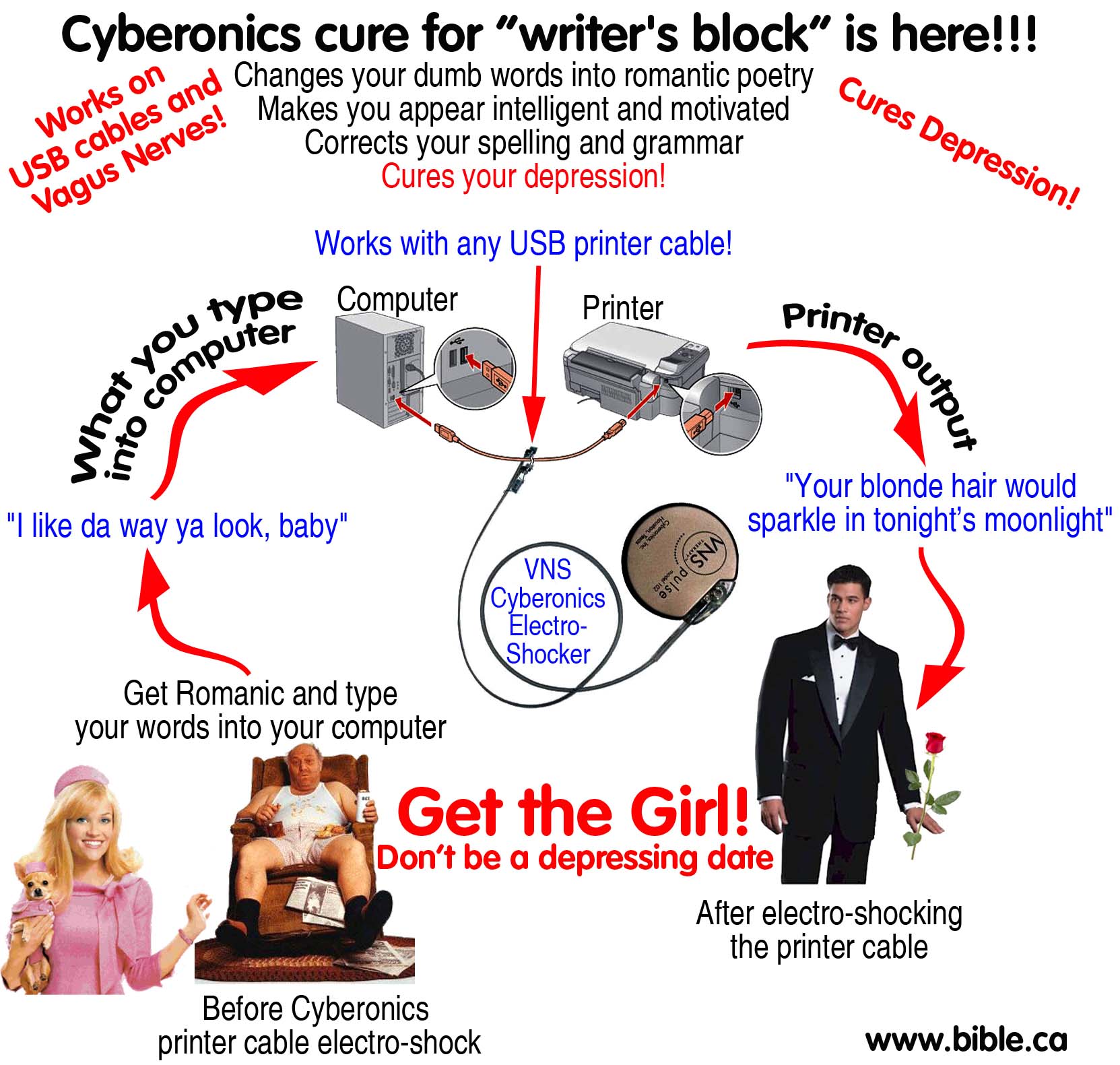
- Psychiatry has a long history of being caustically hostile to Christianity and openly mocks this duel nature of man in the current edition of the DSM manual describing Christian doctrine as "foolish and obsolete, unfortunate, a plague, misleading, silly, ghost in the machine". Below are two entries from the DSM manual:
- "The Retirement of the Term Organic: The accumulating knowledge about the biological factors that contribute to the traditionally nonorganic mental disorders has made this "organic" versus "nonorganic" dichotomy foolish and obsolete. For example, no one would seriously argue that Schizophrenia or Bipolar Disorder are unrelated to brain dysfunction." (DSM-IV-TR Guidebook, 2004 AD, p 85)
- "The Term Mental Disorder: At least since Descartes there has been an unfortunate philosophical position that dichotomizes the mind and the body. The effects of Cartesian dualism of mind and body continue to plague psychiatric classification and are evident in the survival of other misleading derivative dichotomies (e.g., terms such as organic versus non-organic and mental disorders versus physical disorders). Fortunately, Descartes's dialectic is yielding to a modern synthesis forged by the converging trends of philosophy (Ryle's exorcism of the "ghost in the machine") and science (the emerging understanding of the specific ways in which the brain works to produce behaviors). The use of the term mental disorder in the title of DSM-IV-TR (The Diagnostic and Statistical Manual of Mental Disorders) is an anachronistic preservation of the Cartesian view. This term appears increasingly silly as we learn more and more about the physical correlates of thought, emotion, and psychopathology. The term most frequently suggested as an alternative to replace mental disorders has been brain disorders, but this is equally unfortunate and reductionist in the opposite extreme. Preferable terms for the universe of conditions defined in DSM-IV would be psychiatric disorders or psychological disorders, but neither of these is feasible because of the possible professional turf conflicts they might incite among psychiatrists, psychologists, and other mental health professionals. Unfortunately, we could not come up with a better term than mental disorders and thus it survives in DSM-IV-TR." (DSM-IV-TR Guidebook, 2004 AD, p 14)
- Notice that they believe that the brain directly
"produces behaviours" and moral choices. This is the foundation
of the insanity
plea because sinners and criminals are merely obeying their
"irresistible chemical impulses" like a robot. The Christian can
easily see the error in this because there are no "get out of
judgement" excuses for any behaviours on judgment day.
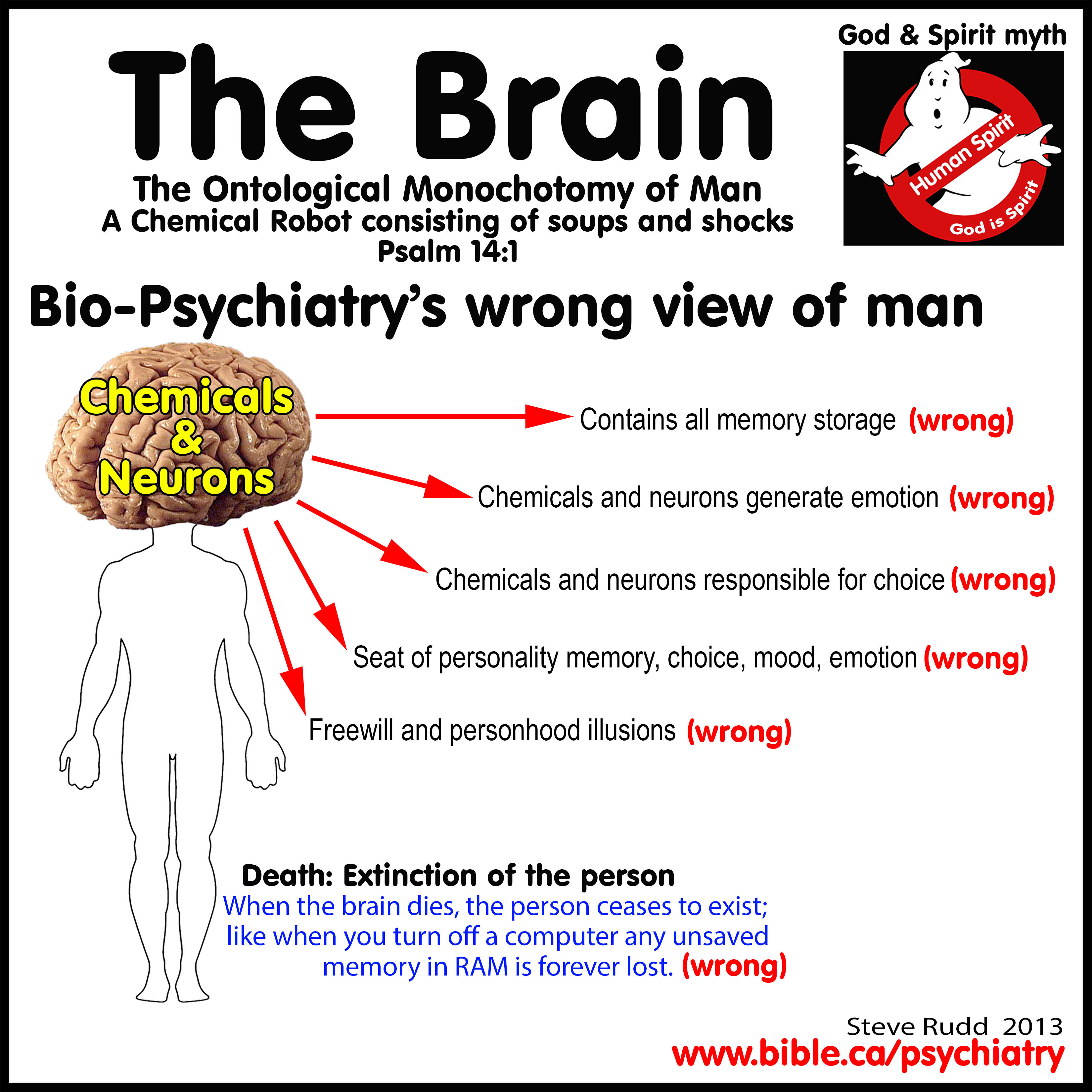
I. Objections answered:
- How to explain amnesia? If the memory remains intact in
the spirit, how come people who have experience brain trauma must relearn
who their children are and skills they used at work?
Answer: We experience amnesia every day. We forget 99% of what we have done in the past. For example, try to remember what you did 2 weeks ago, much less give an hour by hour account of what you did and where you were. So amnesia is a common every day normal experience. Head trauma triggering amnesia is of a greater magnitude only in degree. Electroconvulsive shock therapy triggers temporary amnesia.
Conclusion:
1. Darwinian, humanistic Biopsychiatrists who reject God have option but to reject the spiritual nature of man. Indeed, they mock the dual nature of man in the DSM-IV Guidebook. This forces them to explain all human nature in material, robotic, genetic and chemical terms. They must view the personality of man as the result of "soups and sparks".
2. The Christian rejects all this foolishness and accepts that man is indeed dichotomous in nature, possessing both a physical body and a non-physical spirit.
3. The Christian understands that the seat of mood and emotion arise from the spirit not the body.
4. The Bible doctrine of conscious life after death proves that man's personhood does not reside in the fleshly brain. The story of Lazarus and the rich man (Luke 19:21) confirm this truth.
5. This is why chemical psychiatrists have never found a biological etiology for any mental illness including schizophrenia.
6. Mental illness, anxiety, depression, delusion, paranoia and schizophrenia are all behaviour choices that have their origin in the human spirit not the physical body.
By Steve Rudd: Contact the author for comments, input or corrections.
Send us your story about your experience with modern Psychiatry
